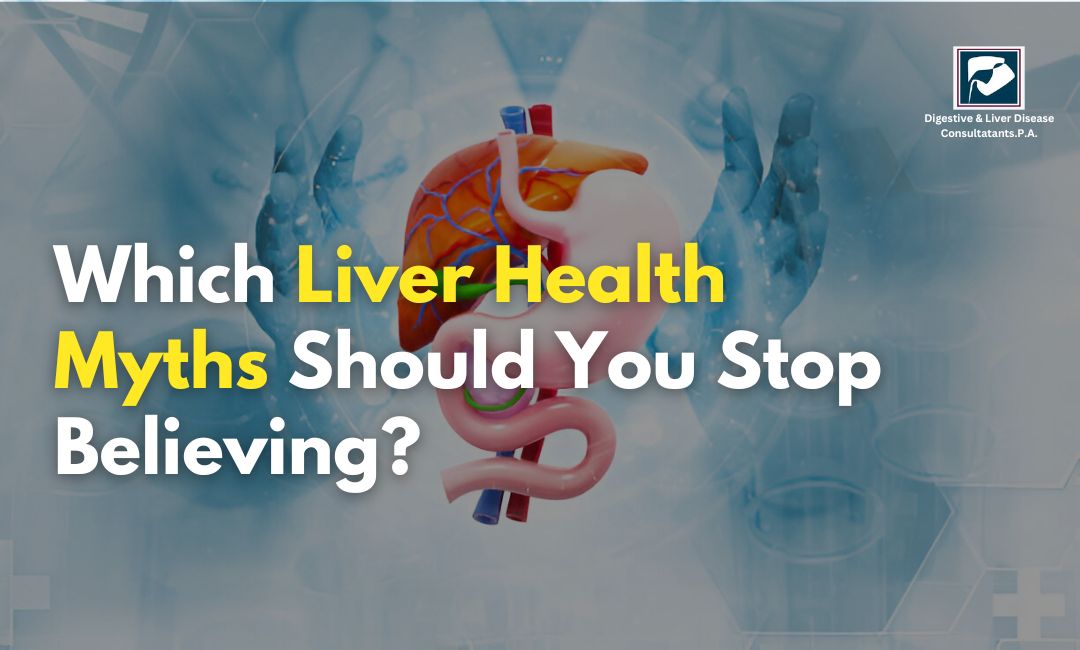Your liver is one of the most hardworking organs in your body, handling everything from filtering toxins to producing vital proteins. Yet, there’s a lot of misinformation surrounding liver health, leading many people to make decisions based on myths rather than facts. In this blog, we’ll debunk some common liver health myths and set the record straight. By the end, you’ll have a clearer understanding of how to truly care for your liver and when to seek professional advice.
Myth 1: Only Alcohol Damages the Liver
Many people believe that liver damage is only caused by excessive alcohol consumption. While alcohol is a significant factor, it’s far from the only one. Non-alcoholic fatty liver disease (NAFLD) is a growing concern and can occur in people who drink little to no alcohol. Factors like obesity, poor diet, diabetes, and high cholesterol can all contribute to liver damage.
The Truth: A healthy lifestyle—including a balanced diet, regular exercise, and managing chronic conditions—is crucial for liver health, regardless of your alcohol consumption.
Myth 2: You Can Feel Liver Damage
One of the most dangerous misconceptions is that you’ll know when your liver is in trouble. Unlike other organs, the liver doesn’t have pain receptors, so it won’t send you direct signals. Most people with liver disease don’t experience symptoms until the condition is advanced, making early detection challenging.
The Truth: Regular check-ups and blood tests are essential for monitoring liver health, even if you feel fine.
Myth 3: Detox Teas and Cleanses Improve Liver Health
Detox teas, juice cleanses, and other “quick fixes” are heavily marketed as ways to "cleanse" your liver. However, there’s little scientific evidence to support their effectiveness. In fact, some detox products can do more harm than good, potentially causing liver toxicity.
The Truth: Your liver is naturally equipped to detoxify your body. Instead of relying on fads, focus on eating a nutritious diet, drinking plenty of water, and avoiding harmful substances.
Myth 4: Liver Disease Only Affects Older Adults
It’s easy to assume that liver problems are an issue for older generations, but liver disease can affect people of all ages. Conditions like hepatitis, genetic disorders, and NAFLD are increasingly being diagnosed in younger populations, often due to lifestyle factors like poor diet and lack of exercise.
The Truth: No matter your age, it’s never too early to adopt liver-friendly habits and get regular health screenings.
Myth 5: Liver Damage Is Always Permanent
Many people believe that once the liver is damaged, there’s no way to reverse the effects. While this is true for advanced stages of liver disease, such as cirrhosis, the liver has a remarkable ability to regenerate itself in its earlier stages.
The Truth: With timely intervention and lifestyle changes, it’s possible to stop or even reverse certain types of liver damage.
Myth 6: Herbal Supplements Are Always Safe for the Liver
Herbal supplements are often considered natural and harmless, but this isn’t always the case. Some herbs and over-the-counter supplements can be toxic to the liver, especially when taken in large doses or combined with other medications.
The Truth: Always consult with a healthcare provider before starting any supplement, particularly if you have existing liver concerns.
Myth 7: You Can Ignore a Fatty Liver If You Don’t Have Symptoms
A fatty liver (steatosis) is often dismissed as harmless, especially when it doesn’t cause immediate discomfort. However, if left unchecked, fatty liver can progress to more severe conditions like non-alcoholic steatohepatitis (NASH), fibrosis, or cirrhosis.
The Truth: Fatty liver is a warning sign. Addressing it early through weight loss, exercise, and dietary changes can prevent serious complications.
How Digestive & Liver Disease Consultants, P.A. Can Help
At Digestive & Liver Disease Consultants, P.A., we understand how vital your liver is to your overall health. Our team of experienced gastroenterologists specializes in diagnosing, managing, and treating a wide range of liver conditions. From routine screenings to advanced treatments, we provide personalized care tailored to your needs.
We’re committed to educating our patients, empowering them to make informed decisions about their health. If you have concerns about your liver or digestive system, we’re here to guide you every step of the way.
When to See a Doctor
If you’re experiencing any of the following symptoms, it’s important to consult a healthcare professional:
- Persistent fatigue or weakness
- Yellowing of the skin or eyes (jaundice)
- Abdominal pain or swelling
- Unexplained weight loss
- Dark urine or pale stools
These symptoms could indicate a liver issue that requires immediate attention. At Digestive & Liver Disease Consultants, P.A., our compassionate team is ready to help you get to the root of the problem.
Conclusion
Your liver plays a crucial role in keeping your body healthy, but it’s often taken for granted. By debunking these common myths, we hope to empower you with accurate information to protect your liver for years to come. Remember, liver health isn’t about quick fixes—it’s about long-term care and regular check-ups.
Contact Digestive & Liver Disease Consultants, P.A. for expert liver care. Your health deserves the best!






